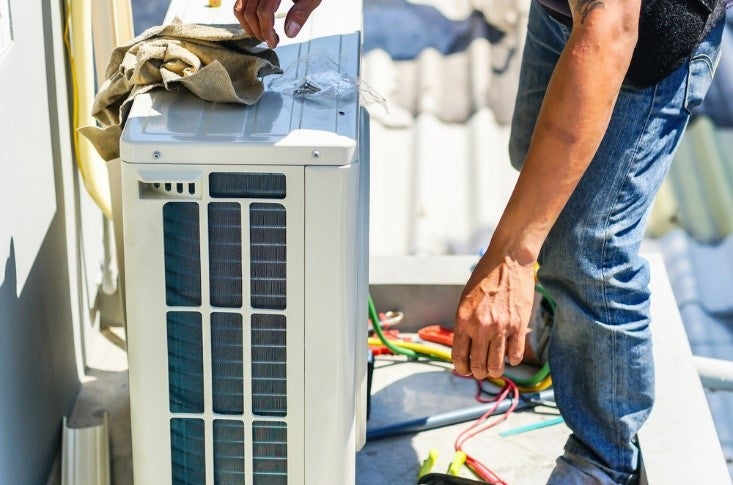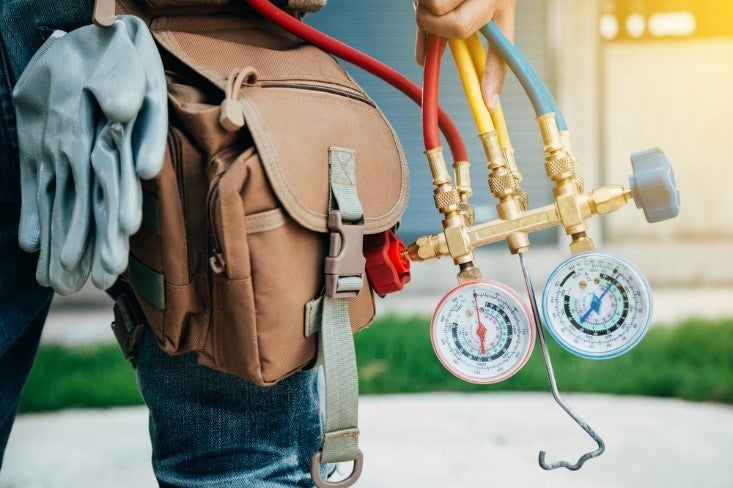Your Guide to Buying a New AC Unit

Need a new AC unit for your home to help you beat the heat? Use this guide to make sure you're covering everything you need to know to buy an AC unit.


Need a new AC unit for your home to help you beat the heat? Use this guide to make sure you're covering everything you need to know to buy an AC unit.
Buying a new air conditioner might not be as fun as shopping for a new sofa or piece of artwork, but some common HVAC problems mean that replacing, rather than repairing, is the right way to spend your money. Prices of air conditioners today can vary, but As with anything else, you get what you pay for, so it’s best to consider that when evaluating the price of a new air conditioner.
Make sure you get the right size unit and know what new AC units cost in your area. Get quotes from some different contractors to get the best deal, but be wary of offers that are seemingly too good to be true by being significantly lower than all the others. Here are some other things to look out for when you’re on the hunt for the best air conditioning units.
Air conditioner efficiency is measured using the seasonal energy efficiency rating, or SEER. Effective starting in 2023, federal regulations will require new air conditioner units in the northern half of the U.S. to have a SEER rating of at least 14 and in the southern half, a rating of at least 15. If you want the quietest air conditioner with the most features, go for a unit with a higher SEER rating. The higher the SEER, the lower your operational costs. But, be advised that a higher SEER typically means a higher up-front purchase and installation cost. A SEER of 14 to 16 meets efficiency requirements without making up-front costs too out of reach.
When you’re talking AC units, tonnage doesn’t refer to the unit’s weight but rather to the amount of heat that the unit can remove from your home in one hour. A one-ton unit can remove 12,000 British Thermal Units (BTUs) of heat from your home in one hour.
It’s important to buy an air conditioning unit that’s properly sized because a unit that’s too small won’t cool efficiently, and one that’s too large will cycle on and off frequently, wearing out faster. A unit that’s too large won’t be able to remove humidity from your home efficiently, either. Both oversized and undersized units will drive up operational costs. Undersized units cost more to operate because they run all the time as they struggle to keep up with your home’s cooling needs, while oversized units simply draw more power.
So, what tonnage is best for your home? The answer will depend on your local climate, the size of your home, the amount of insulation you have in your attic and basement, your home’s orientation to the sun and the number and size of your windows, along with other factors. To evaluate your home’s needs—and before jumping right into air conditioning installation—a technician should enter your attic, basement, and crawl spaces and examine every room of your home.

Thinking about coverage?
Sounds like a plan. Find the warranty that fits you best.
AC unit installation cost can run between $3,800 and $7,400, depending on local market factors, the type and size of the unit, if ducted air conditioning is required, a new furnace installed at the same time, and other considerations. Do some research ahead of time to get a ballpark idea of what a new AC unit installation prices in your area. Compare AC units to understand what are considered the best air conditioning units and affordable air conditioning options to find the best solution for your home and budget.
In some cases, a ductless air conditioner may make the most sense for your home; some types have lower installation costs. For instance, installing a window air conditioner will be cheaper than central air conditioning installation.
If you’re considering an air conditioning replacement in the future, ask the technician during your next HVAC tune-up what a new air conditioning install would cost. You can also talk to friends and neighbors who may have had a new HVAC installed recently.
If you do decide to purchase a new AC unit, an air conditioner warranty with American Home Shield® can help cover the costs of repairs for future breakdowns. We help protect major components of your systems and appliances no matter their age, and we don't require inspection or maintenance records. Think that’s too good to be true? Learn more about our coverage plans and pricing to see for yourself.
When it’s time to get your new air conditioner, get at least three quotes. Whether you prefer to shop online or in person, it’s best to research costs before buying an AC unit. You could start by asking the company that does your regular AC tune-ups, especially if you like their work. Ask friends and family to recommend a good air conditioner, and check out online reviews to help you decide.
When buying an air conditioner, look for energy efficiency ratings (such as SEER or EER), the size and cooling capacity appropriate for your home, noise levels, and features like smart thermostats or air quality filters. Also, consider the brand’s reputation, warranty, and cost of installation and maintenance.
To choose a central air conditioner, assess the cooling needs of your home by considering the square footage, insulation, and number of rooms. Look for units with a high SEER rating for energy efficiency, and choose a reputable brand with good warranties. It's also important to hire a licensed HVAC professional to ensure proper installation and maintenance.
To get the best deal on a new HVAC system, start by comparing quotes from multiple stores and websites. Look for seasonal promotions, manufacturer rebates, or financing options that can reduce the cost of a new AC. Choosing a more energy-efficient model with a high SEER rating may offer long-term savings through lower energy bills and rebates from utility companies.
While it's possible to install a window or portable AC unit yourself, installing a central AC system or ductless mini-split requires professional expertise. These systems involve electrical work, refrigerant handling, and ensuring proper airflow, which must meet building codes and safety regulations. It's recommended to hire a licensed HVAC professional to ensure the installation is done correctly and to avoid voiding the manufacturer’s warranty.
We hope this guide to buying a new air conditioner will help you on your journey to cooling your house and making your life—and the temperature—a little bit more comfortable.
Explore how our home warranty plans can help keep your A/C in working order all season long.

AHS assumes no responsibility, and specifically disclaims all liability, for your use of any and all information contained herein.
Have a plan for your home when things don't go according to plan
Shop Home Warranties